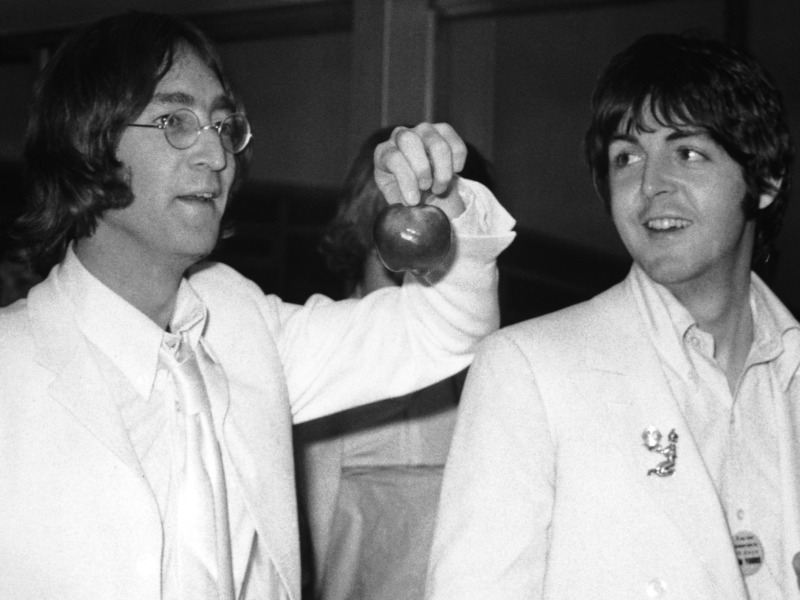Il y a 55 ans : Les Beatles enregistrent les démos de l’album blanc
Il y a 55 ans cette semaine, en mai 1968, les Beatles ont commencé à enregistrer des démos sur quatre pistes pour leur double album éponyme, communément appelé « White Album ». Les légendaires démos du groupe, qui ont longtemps fait l’objet de trafics, ont finalement été publiées en 2018 dans le cadre du coffret super deluxe de l' »Album blanc ».
Les chansons, qui ont été principalement enregistrées en groupe dans le bungalow anglais de George Harrison à Esher, comprenaient du matériel écrit par le groupe pendant leur séjour tristement célèbre dans l’ashram de Maharishi Mahesh Yogi à Rishikesh, en Inde. De retour en Angleterre, John Lennon, Paul McCartney et Ringo Starr se sont retrouvés dans la maison de Harrison et, pour la seule et unique fois dans la carrière du groupe, ont enregistré des versions acoustiques de leur dernière musique.
Le cinéaste Paul Saltzman a relaté son séjour à Rishikesh pour étudier la méditation transcendantale avec le groupe dans son livre de photos The Beatles In India, et nous a dit qu’ils étaient toujours amicaux et accessibles : [“John looked up at me, and he was two feet away from me, and I said, ‘May I join you?’ and John said, ‘Sure mate, pull up a chair.’ And Paul said, ‘Come and sit here’ — he pulled next to him and I sat down. At that moment John turns to me, ’cause they had finished their conversation, and he says, ‘So, you’re American then?,’ in his sort of teasing way. And I said, ‘No, Canadian,’ and he turns to the group and says, ‘Ah, he’s from one of the colonies!’ And everyone breaks up (in laughter).”] SOUDCUE (:24 OC : . . . tout le monde se sépare)
L’album blanc de 1968 a marqué une renaissance créative pour John Lennon et a ouvert la voie à ses œuvres solo plus brutales et plus intenses dans les années 1970 : [“Looking back at it, whenever I comment about writing, I always (laughs) seem to be suffering, whether it was writing ‘A Day In The Life.’ or whatever. When I comment on every little thing it’s like I’m suffering. I always seem to have an intense time writing, thinking ‘this is the end’ and ‘nothing’s coming’ and ‘this is dumb’ and how can. . . and y’know, ‘this is no good’ and all that business.”] (:20 OC : . . . toute cette histoire)
Paul McCartney a écrit plusieurs chansons d’actualité et sociopolitiques au fil des ans. Ce n’est que depuis une dizaine d’années qu’il a révélé que « Blackbird » avait été directement inspirée par le mouvement des droits civiques au cours des turbulentes années 1960 : [“When you do a show, certain songs, you just find yourself talking about them. I could probably talk about every single song and find a story about it, but when you find a story that seems to mean something, you tend to just keep it in. In England, we call girls ‘birds’ — and so it’s a double meaning. And it was originally about the struggles going on in Alabama, particularly, in the ’60s, and the civil rights disturbances. Which, y’know a lot of us with any morals around the world were very sensitive to and very supportive of the people who were going through the rubbish that they were going through.”] (:34 OC : . . . étaient en train de traverser)
Les démos « Esher » des Beatles comprennent :
« Back In The U.S.S.R. »
« Dear Prudence »
« Oignon de verre »
« Ob-La-Di, Ob-La-Da »
« L’histoire continue de Bungalow Bill »
« While My Guitar Gently Weeps » (Ma guitare pleure doucement)
« Happiness Is A Warm Gun »
« I’m So Tired »
« Blackbird »
« Piggies »
« Rocky Raccoon »
« Julia »
« Yer Blues »
« Mother Nature’s Son »
« Tout le monde a quelque chose à cacher sauf moi et mon singe »
« Sexy Sadie »
« Revolution »
« Honey Pie »
« Cry Baby Cry »
« Sour Milk Sea »
« Junk »
« Child Of Nature »
« Circles »
« Mean Mr. Mustard »
« Polythene Pam »
« Not Guilty »
« What’s The New Mary Jane »



